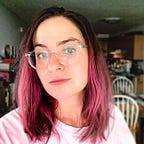Finding Mentors
My experience with finding mentors and with different kinds of mentorship
Whenever I feel stuck or at a loss in my career I seek out advice. When I look back over the last decade, I’ve been incredibly lucky and received lots helpful guidance from many wonderful mentors.
I consider my graduate thesis advisor to be my first real career mentor. David helped me polish my writing, suggested improvements, and supported me when I was presenting my work at conferences. Aside from professors and managers I’ve had four other major sources of mentorship, all of them focused on my professional development as a designer.
The 4 sources of mentorship
- Design mentors at UX Academy
- Career mentors at Out of Office Hours
- Peer mentoring (UX and coffee mornings with my friend Alice)
- Mentorship Circle (D.circle with Julie Zhou and more)
Design Mentors at UX Academy
I love the model of learning at UX Academy. You are assigned mentors who help you work through the course material. Having someone to talk to made me reflect more on the material I was learning. And I’d never have gotten as far as I have without the feedback I received.
Here are some of my favorite mentors from UX Academy. They were helpful, considerate and above all great human beings:
- Hendrika Makilya — Who showed me that user interface design can be fun and that I should explore it playfully.
- Carolina de Bartolo — Whose detailed feedback helped me polish my interaction design.
- Vesna Plank — Who taught me the importance of the design process and always asking “who is this for?”
After I graduated, I was guided by Harish Venkatesan , the CEO of DesignLab (the organization behind UX Academy). Harish PMd my first contract after the academy, helped me negotiate my professional fees, and was a constant source of reassurance that I was doing a good job.
The greatest thing about UX Academy mentors: in depth feedback and guidance appropriate to your context and the community that comes with it.
Out of Office Hours (OOOH)
Here is how Out of Office Hours works: you submit an application and then they email you a list of mentors. You are allowed to book four 30 minute meetings each time you are selected.
I did a series back in 2018 and in 2020.
Similar to Bee Martinez I filled out the application and forgot about it until I got an email saying that I was selected to meet with mentors.
There are so many fascinating people volunteering their time to mentor. The choice is overwhelming. I went about deciding who to meet by thinking what I would like help with. In 2018 I just started a new job and I was concentrating on improving my performance and honing my expectations. In 2020, I was working on my 5 year plan. I’m clarifying the vision of where I want to be in 5 years and drawing out the steps of how I will get there.
The greatest things about OOOH: The mentors come from such diverse backgrounds and roles. I feel like I can get a very well rounded perspective on my issues.
Peer mentoring — UX & Coffee
I heard about peer mentoring on the Design Life podcast but I never thought I’d get organized enough to start doing it. Then, I realized I was already doing peer mentoring! I have been meeting with my friend Alice for morning coffee, ux, and chat since 2018. Alice is such a driven inspiring person, I have learned so much from her. We usually have a scheduled biweekly coffee in the morning before we both start work. We talk about our work, challenges, and share interesting stuff and inspiration.
The greatest thing about peer mentoring: I tend to open up more with a friend and peer and it feels great to be helpful to someone else.
D.Circle
This is a new frontier.
I joined D.Cicrle organized by Julie Zhuo in 2020. I got to meet some incredible women and work on some hard problems. Before each meeting Julie asked us to write answers to some questions related to the topic we were discussion. Being FORCED to reflect and write pushed me to consider what my own truth is. Reading others’ reflections created a very special bound and understanding.
I love D.Circle so much I want to bring that experience to women in my community. Based on Julie’s model I’m creating a peer mentoring circle for women designers.
The greatest thing about d.circle: The vision of a community of women growing together as we each try to name our own truth.
TL;DR Summary
- Mentors are awesome and there are all kinds of mentors: official, unofficial, mentors for your craft, and mentors for your career
- If you feel like you need guidance — look for help, there are actually a lot of mentorship opportunities out there if you seek them out
- Do the work — fill in the applications and reach out
- To get the most out of your opportunities come prepared to every meeting, have a list of questions or issues you want to discuss.
